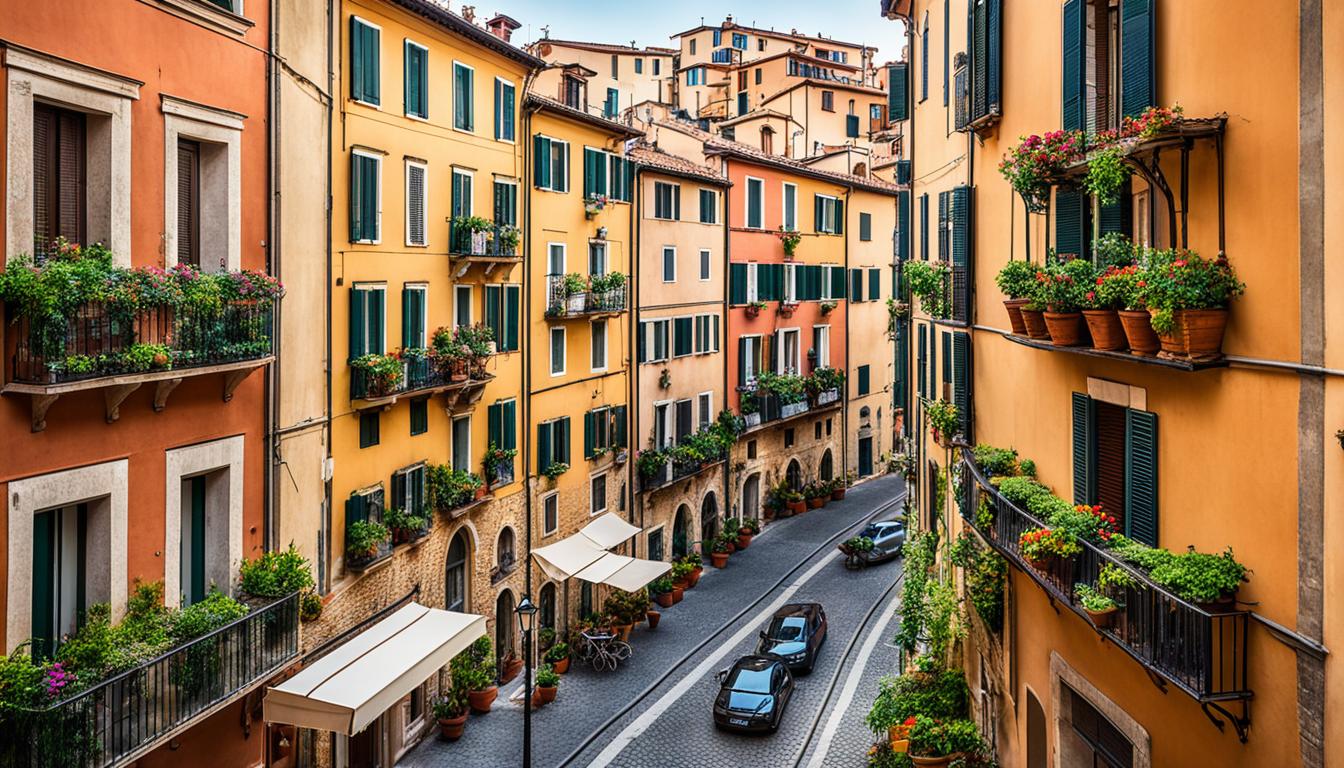The housing in Italy is a fascinating mix of history and modern life. If you’re from the UK thinking of buying property in Italy, it’s key to know the Italian property market well. This article will help clear up the different types of properties, like charming villas in Tuscany and busy flats in Milan. It will also look at the balance between renting and owning homes. By the end, readers will know more about the Italian housing system.
Key Takeaways
- Italy’s housing market is diverse, offering a range of properties to suit different tastes.
- Understanding local laws and customs is crucial for successful property transactions.
- Renting versus buying requires careful consideration of individual circumstances.
- Several regions in Italy present unique investment opportunities.
- Legalities around residency can affect foreign buyers significantly.
- Various financing options exist to support homebuyers in Italy.
Overview of the Italian Housing Market
The Italian housing market has seen changes in recent years, affected by economic factors. Property trends show a slow recovery after the financial crisis, with different effects in various areas. Cities like Milan and Rome have seen property values go up, while rural areas have seen slower growth.
There is often more demand than supply in cities, making it competitive for buyers. International investors have also been interested, pushing prices up in popular areas.
Statistics show the average property value in Italy went up by about 4.5% last year. This shows a strong market, even with issues like high taxes and costs linked to owning property.
The following table summarises key indicators of the Italian housing market:
| Region | Average Property Price (€) | Annual Growth Rate (%) | Demand Level |
|---|---|---|---|
| Rome | 3,200 | 4.0 | High |
| Milan | 3,800 | 5.5 | Very High |
| Florence | 2,900 | 4.2 | Moderate |
| Naples | 1,800 | 3.8 | Moderate |
| Bologna | 2,500 | 3.5 | High |
Investors should watch the trends and changes in the Italian housing market closely. This will help them make smart choices.
Types of Properties Available in Italy
The Italian property market has a wide range of options for investors and homebuyers. It caters to different tastes and needs. Knowing the main types of properties helps buyers make better choices.
Residential Properties: An In-Depth Look
Italy offers many residential properties, like villas, apartments, and historic homes. Each type has its own price and unique features. For example:
| Property Type | Average Price (per square metre) | Popular Locations |
|---|---|---|
| Villas | €2,000 – €5,000 | Tuscany, Amalfi Coast |
| City Apartments | €3,000 – €7,000 | Rome, Milan, Florence |
| Historic Homes | €1,500 – €4,000 | Venice, Bologna |
This variety lets investors target various markets and appeal to different buyers. It suits both those looking for luxury and those on a budget.
Commercial Properties and Their Significance
Commercial real estate in Italy is crucial for the economy, with growth potential in cities and tourist spots. Key types include:
- Retail Spaces: Popular in tourist cities like Florence and Venice.
- Office Buildings: Preferred in big cities; Milan is a top spot for business.
- Hotels and Hospitality: With Italy’s tourism, investing in hotels can be profitable.
Understanding the market demand and investment potential of these properties helps stakeholders succeed in the Italian property market.
The Process of Buying Property in Italy

Buying property in Italy is a step-by-step process. It starts with collecting important documents to follow Italian laws. You’ll need a “Codice Fiscale,” like a tax ID in the UK, and valid ID. These steps are key to a successful buy.
Essential Documents Needed for Purchase
Getting ready for buying property means gathering certain documents. You’ll need:
- Proof of identity (passport or national ID)
- Codice Fiscale (tax code)
- Proof of income and financial stability
- Evidence of any existing property ownership
Submit these documents to start the buying process. They help build trust with sellers and banks.
Understanding Notary Services in Italy
Italian notaries are crucial in buying property. They make sure the sale is legal and all paperwork is correct. They check property titles, prepare sale deeds, and register the sale.
Notary fees depend on the property’s value. Working with an experienced notary makes the process easier and safer.
Housing in Italy: Renting vs Buying
When thinking about housing in Italy, you might wonder whether to rent or buy. Each choice has its pros and cons. It’s important to look at both sides carefully.
Renting in Italy is great for those who like flexibility. It lets you move easily, try out new places, or change your life plans without the hassle of owning a home. Renters also start with lower costs, which can be used for other things or travel.
Buying a home in Italy can be a smart move for the long run. It offers stability and can be a good investment, especially when the market changes. Owners can see their property’s value go up, which can help with future money needs. Plus, you can make your home your own without rental rules.
Choosing between renting and buying depends on your life, money goals, and what you want from a home. Thinking about these things can help you make a choice that’s right for you.
| Aspect | Renting Property | Buying Property |
|---|---|---|
| Initial Costs | Lower upfront costs | Higher initial investment |
| Flexibility | High – Easier to relocate | Low – Committed to a location |
| Long-term Investment | Not an investment | Potential for appreciation |
| Personalisation | Limited options | Full control over modifications |
Key Regions for Property Investment
The Italian landscape is full of chances for property investment, especially in different areas. Each place has its own special features, drawing in various investors. Knowing about Northern and Southern Italy can help those wanting to invest in the Italian real estate market.
The Allure of Northern Italy
Northern Italy is known for its strong economy and modern lifestyle. Cities like Milan and Turin are famous for their lively economies and cultural importance. Investors like these areas for several reasons:
- Strong job market and economic chances.
- A rich cultural scene, including fashion, art, and cuisine.
- Access to beautiful landscapes, like the Italian Alps and lakes.
Places like Como and Lecco are great for investors. They offer peaceful settings with good rental potential. These areas are perfect for those targeting wealthy tourists and expatriates.
Attractions of Southern Italy Real Estate
Southern Italy has its own special qualities, like a deep cultural heritage and beautiful coastlines. Cities such as Naples and the Amalfi Coast draw in investors from around the world. Here’s why Southern Italy is so appealing:
- Affordable property prices compared to the North.
- Strong tourism during the summer.
- Historical sites that attract culture-focused investors.
Investing here can lead to profitable short-term rentals. These rentals are popular with tourists and locals looking for seasonal places to stay.
| Region | Key Cities | Investment Highlights |
|---|---|---|
| Northern Italy | Milan, Turin, Como | Strong economy, vibrant lifestyle |
| Southern Italy | Naples, Amalfi Coast | Affordable prices, rich culture |
Legal Considerations for Foreign Buyers

Foreign buyers in Italy face many legal challenges when buying property. It’s key to know the legal issues property buyers in Italy deal with. Understanding residency in Italy is vital for owning property. Knowing these rules helps buyers make smart choices and avoid problems.
Understanding Residency and Legalities
You don’t need to live in Italy to buy property. Foreign buyers have the right to buy real estate without many limits. But, some things might affect your purchase, like how you plan to use the property or your financial situation. Getting legal advice is a good idea to understand these points.
- Legal framework: The Italian legal system clearly states the rights of foreign buyers.
- Residency requirements: The rules change if you plan to live in Italy or rent out the property.
- Ownership compliance: Make sure you follow Italy’s laws on owning property.
Before buying, talk to a lawyer who knows Italian property law. This helps make sure everything is legal and lowers the risk of legal issues.
| Aspect | Details |
|---|---|
| Property Types | Residential and commercial properties are available to foreign buyers. |
| Taxation | It’s important to understand taxes for non-residents for financial planning. |
| Legal Support | Getting legal advice is recommended for help on foreign buyer rights in Italy. |
Financing Options for Homebuyers
When looking to buy a property in Italy, it’s key to know about the financing options. There are many mortgage options for those financing property Italy, especially for non-residents. These options help a wide range of financial situations, making it easier for foreign buyers to enter the Italian market.
Mortgage Process for Non-Residents
The mortgage process for non-residents is different from what local buyers go through. Lenders need important documents like proof of income, bank statements, and ID. Non-residents might face higher interest rates than locals. It’s vital to compare different banks to find the best terms.
Understanding the rules is crucial. A mortgage specialist familiar with Italian policies can make the process smoother.
Government Incentives for Home Purchase
Government incentives can greatly reduce the cost of buying a home in Italy. First-time buyers can get grants and financial help to make buying easier. These benefits include lower stamp duty, tax credits, and other support.
Prospective buyers should look into these schemes in their area. This can affect their budget when buying a home.
Property Taxes and Administrative Fees
For those looking to buy property in Italy, it’s vital to understand the financial side. Property taxes in Italy can greatly affect your investment. You’ll need to think about IMU, a tax for both locals and non-locals, and TARI, which covers waste management. Knowing these taxes helps with better planning.
Also, there are administrative fees housing linked to buying a property. These include notary fees, registration costs, and legal charges. Notary fees are usually 1% to 2% of the sale price. Registration fees depend on the property’s value and are part of the total cost in Italy.
To sum up, here’s a table of key property taxes and fees:
| Tax/Fee | Description | Approximate Cost |
|---|---|---|
| IMU | Municipal property tax | 0.4% to 1.06% of the property’s value |
| TARI | Waste collection tax | Varies by municipality |
| Notary Fees | Legal services for property transfer | 1% to 2% of the purchase price |
| Registration Fees | Official registration of property | 2% of the property value (first home) or 9% (second home) |
Being aware of these home costs Italy helps buyers plan their budgets. It also helps avoid unexpected costs. Well-prepared investors can better navigate Italy’s property market.
The Role of Real Estate Agents in Italy

Real estate agents in Italy are key to the market’s success. They help clients with buying and selling properties. Choosing the right agent is crucial for a good investment. It’s important to know what makes a good agent.
Choosing the Right Agent for Your Needs
When looking for a property agent in Italy, think about these points:
- Experience: An experienced agent knows the market well and can negotiate better.
- Local Market Knowledge: They understand the area, helping you make informed decisions.
- Language Skills: Being fluent in English and Italian ensures clear communication.
- Client Feedback: Reviews show an agent’s reliability and success rate.
- Professional Associations: Being part of industry groups shows a commitment to quality.
Creating a good relationship with your agent is vital. Talk openly, share what you want, and ask for advice. A skilled agent will help make buying property in Italy easier and more fun.
| Feature | Benefit |
|---|---|
| Experience | Improved negotiation and transaction handling |
| Local Market Knowledge | Better understanding of property values |
| Language Skills | Enhanced communication and clarity |
| Client Feedback | Informed choice based on reviews |
| Professional Associations | Trust and assurance of quality service |
Maintenance and Upkeep of Italian Properties
Looking after properties in Italy means knowing how to handle both everyday and urgent tasks. Owners must make sure their properties are not just working well but also look good. This includes checking the plumbing, inspecting the roof, and keeping the garden tidy.
Legal rules often set out what maintenance is needed, especially for places rented out. For landlords, following these rules is key to keeping tenants happy and avoiding legal trouble. Both homes and businesses need careful upkeep.
Here are some key points to remember for keeping Italian properties in good shape:
- Make a plan for regular maintenance to tackle common problems.
- Keep records of all maintenance work done.
- Learn about local laws on property upkeep.
- Do seasonal checks to spot and fix issues early.
- Think about getting professional help for tasks you can’t do yourself.
Keeping your property in top condition helps keep its value high. Regular care makes living there better for tenants and keeps your property competitive in the rental market.
| Maintenance Task | Frequency | Responsible Party |
|---|---|---|
| Plumbing Inspection | Annually | Owner/Tenant |
| Electrical Systems Check | Every Two Years | Owner/Tenant |
| Roof Inspection | Bi-Annually | Owner |
| Garden Maintenance | Monthly | Tenant/Professional |
| Exterior Cleaning | Quarterly | Professional Service |
Understanding the value of good property upkeep in Italy is key to your investment’s success. It’s vital for all property owners to take these duties seriously for the best long-term results.
Local Customs and Market Practices
For those looking to buy property in Italy, it’s key to understand local customs and market practices. The way people negotiate property here can be quite different. This is because of cultural values that stress building relationships and trust. Buyers should be ready for negotiations that might be more complex than what they’re used to.
Negotiating the Price: Cultural Insights
In Italy, negotiating property prices often means being informal and building a personal connection. Getting to know the seller or their agent can help you negotiate better. Here are some cultural tips:
- Start with some small talk to build a rapport.
- Be prepared for some back-and-forth negotiation. Haggling is part of the process here.
- Show you’re really interested in the property to improve your bargaining power.
How to Evaluate Property Value
To evaluate property value in Italy, you need to look at both numbers and other factors. Here are some ways to do it:
- Comparative Market Analysis: Look at what similar properties have sold for lately.
- Market Trends: See how the demand and supply of properties are affecting prices.
- Local Amenities: Think about how close the property is to schools, shops, transport, and cultural spots.
By understanding how to negotiate property in Italy and using smart strategies for evaluating real estate, buyers can increase their chances of getting a great property at a good price.
| Evaluation Method | Description | Importance |
|---|---|---|
| Comparative Market Analysis | Assessment of similar property sales. | Gives a realistic view of market pricing. |
| Market Trends | Current demand and supply analysis. | Helps predict future valuation changes. |
| Local Amenities | Proximity to essential services. | Enhances property desirability and value. |
Impact of the Economy on Housing in Italy
The link between the economy and housing in Italy is very important for those looking to buy or invest. Things like GDP growth, job rates, and inflation trends affect the housing market. Knowing these can help with making smart choices when buying property.
When GDP grows, so does the housing market, with property prices going up. More jobs make people feel more confident, leading them to invest in real estate. But, inflation can make buying homes more expensive, so buyers need to plan their finances carefully.
The table below shows how these economic factors affect housing prices:
| Economic Indicator | Impact on Housing Prices |
|---|---|
| GDP Growth | Increases demand for housing, driving up prices |
| Employment Rates | Boosts consumer confidence, enhancing investment willingness |
| Inflation | Reduces purchasing power, potentially lowering demand |
Investors should think about these economic factors when planning their property buys. Understanding the Italian housing market can help make better investment choices. Stay updated on economic changes to make the most of the housing market’s ups and downs.
Trends in the Italian Housing Market
The Italian housing market is seeing big changes, thanks to many factors. These changes bring new chances for investment in Italy. Now, places once ignored are becoming popular for buyers and investors. Cities like Bologna and small towns in Tuscany stand out, offering a mix of city life and peace.
Emerging Areas for Investment
Studies show property values are going up in smaller cities, making Italy a great place for investment. With more people working from home, buyers are looking for places that are quiet yet still have everything they need. Places like Matera, known for its cave homes, and Puglia, with its beautiful coast, are becoming more popular.
Future Projections for Property Prices
Experts think property prices will keep going up, thanks to a growing need for homes that are both comfortable and part of a community. Demand is expected to stay strong, especially in these up-and-coming areas. For those thinking about buying or investing, it’s key to understand these trends in Italy’s housing market.
FAQ
What should I know before buying property in Italy?
Before buying property in Italy, it’s key to know the local housing market. Learn about the different types of properties and the buying process. Understanding necessary documents, tax rules, and the role of notaries helps make the process smoother.
How does the Italian housing market compare to the UK?
The Italian housing market has its own unique features. Prices can be lower in some areas, but consider economic stability, market trends, and legal requirements specific to Italy.
What types of properties are available for purchase in Italy?
Italy has a wide range of properties. You can find everything from city apartments to countryside villas. There are also commercial properties, great for business investments, especially in tourist spots.
What are the key steps in the buying process?
The process includes getting the right documents, finding a notary, and completing legal steps. Having a local expert guide you can help avoid any issues.
Are there advantages to renting rather than buying property in Italy?
Renting offers flexibility and lower costs, ideal for those not wanting to settle long-term. Yet, buying property can be a smart long-term investment, especially if property prices go up.
What are the best regions in Italy for property investment?
Northern Italy is strong economically and has vibrant cities like Milan. Southern Italy is known for its beautiful landscapes and culture. Places like Tuscany and the Amalfi Coast are great for investment.
What legal considerations should foreign buyers be aware of?
Foreign buyers need to know about residency rules, ownership rights, and legal limits on buying property in Italy. Getting legal advice is key to navigating these complexities safely.
What financing options are available for homebuyers in Italy?
Homebuyers can find various financing options, including mortgages for non-residents. There are also government incentives for first-time buyers to help with costs.
What taxation should I expect when buying property in Italy?
Expect to pay property tax (IMU) and local service tax (TARI). Don’t forget to include notary fees and registration costs in your budget when buying property.
How essential are real estate agents in the buying process?
Real estate agents are crucial in the Italian property market. They offer insights into local conditions, help with paperwork, and negotiate for you, making them key to a successful buy.
What maintenance responsibilities will I have as a property owner?
As a property owner, you’ll need to handle regular maintenance, follow legal upkeep rules, and ensure a good living environment if you rent it out. Knowing these duties is important for keeping your property’s value up and tenants happy.
How should I approach negotiating the price of a property in Italy?
When negotiating property prices, understand local customs and market practices. Research similar sales and work with a knowledgeable agent to improve your negotiating position and get a fair deal.
What economic factors influence the housing market in Italy?
The housing market in Italy is affected by GDP growth, employment rates, and inflation trends. These factors can change property prices and investment confidence, so it’s good to stay updated on the economy.
What future trends should I be aware of in the Italian housing market?
The Italian housing market is changing, with new areas becoming popular for investment. Keep an eye on market analysis and economic forecasts to make smart choices about future investments and spot areas with growth potential.









